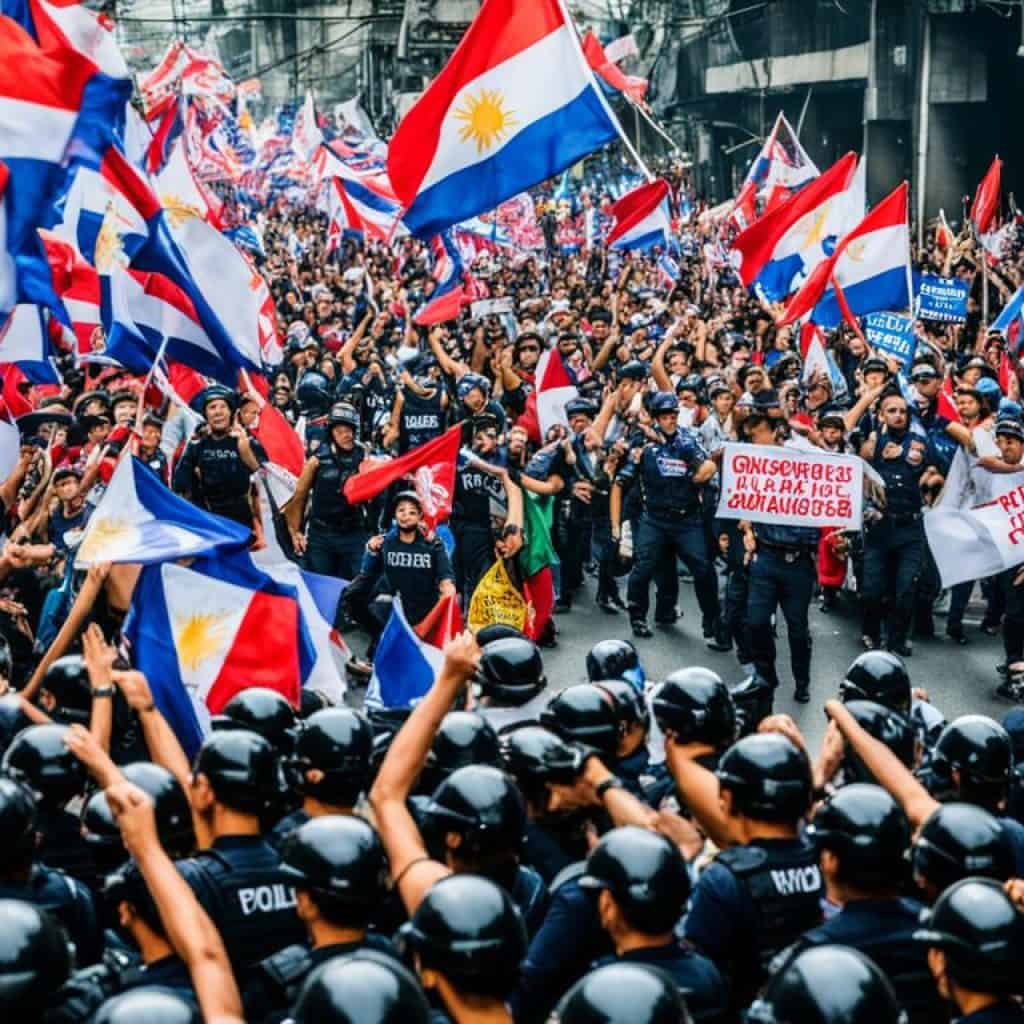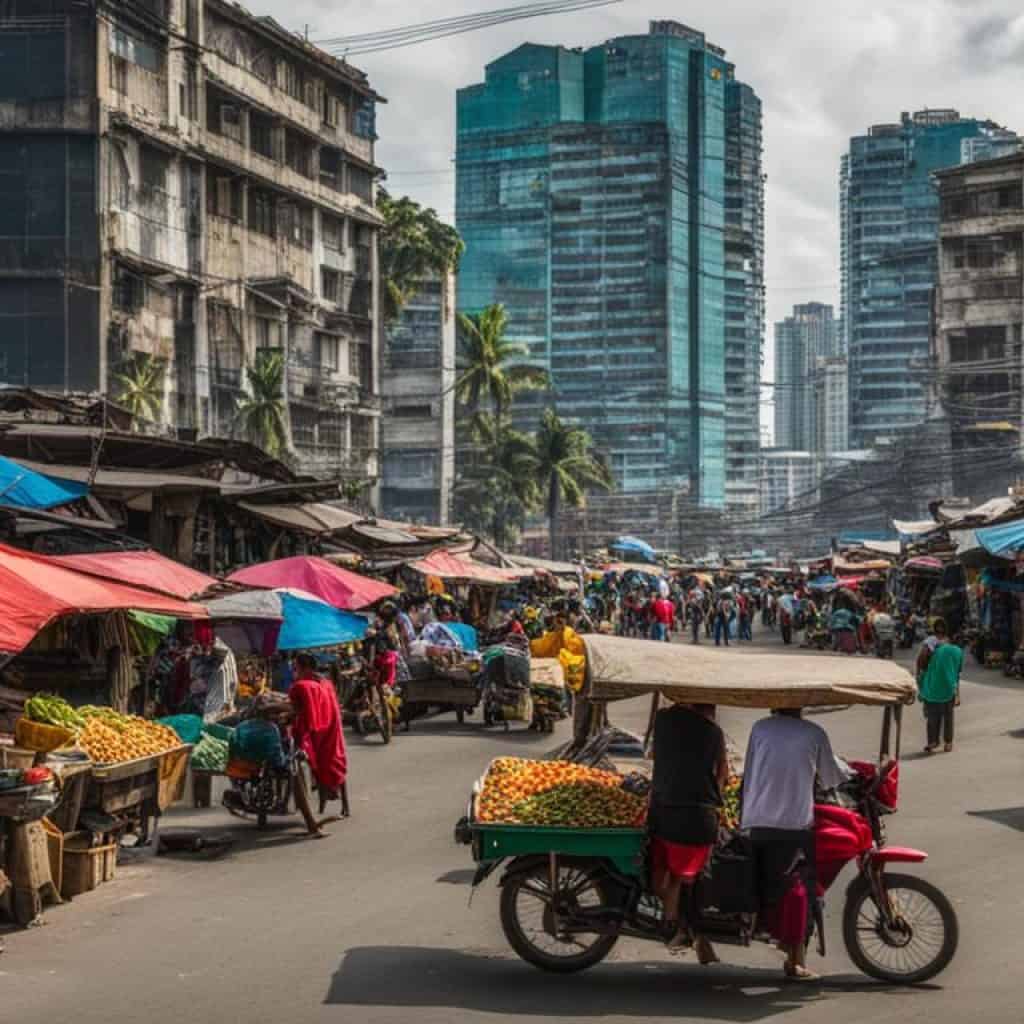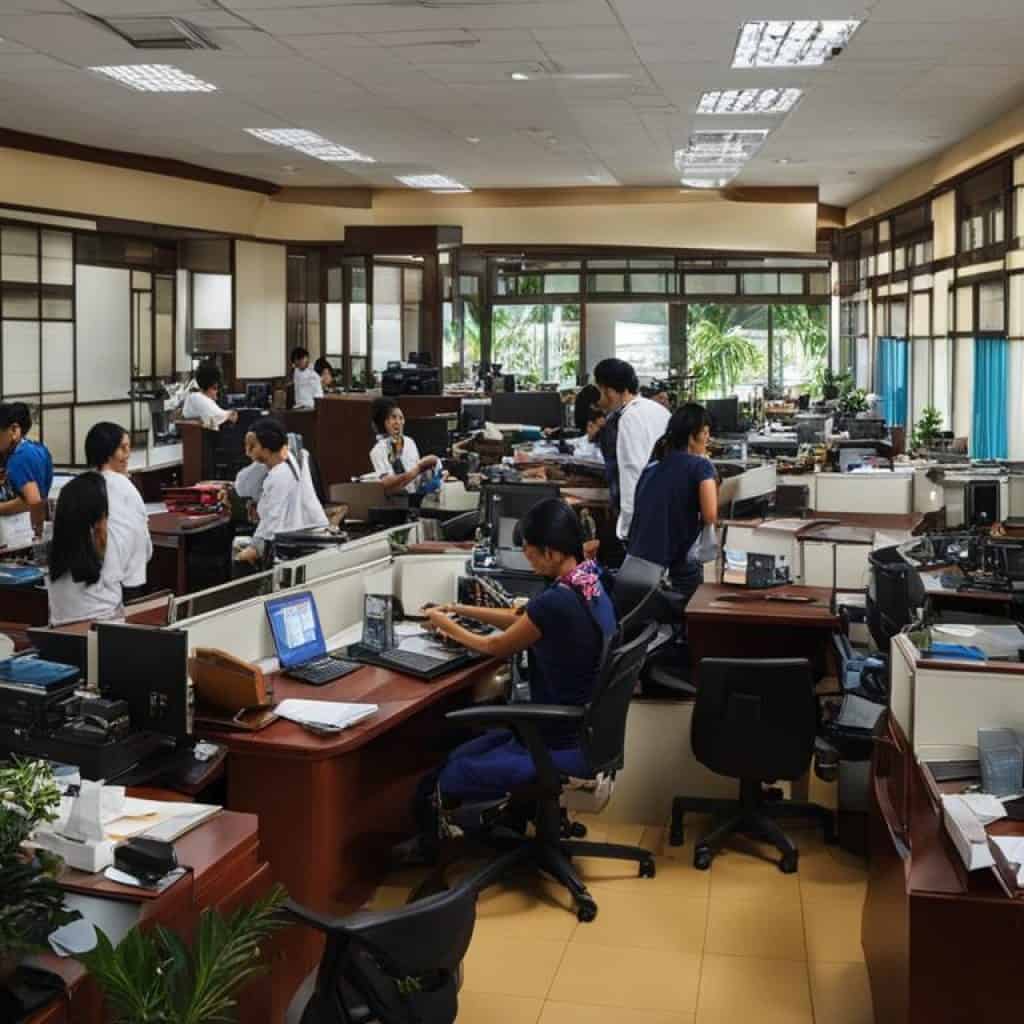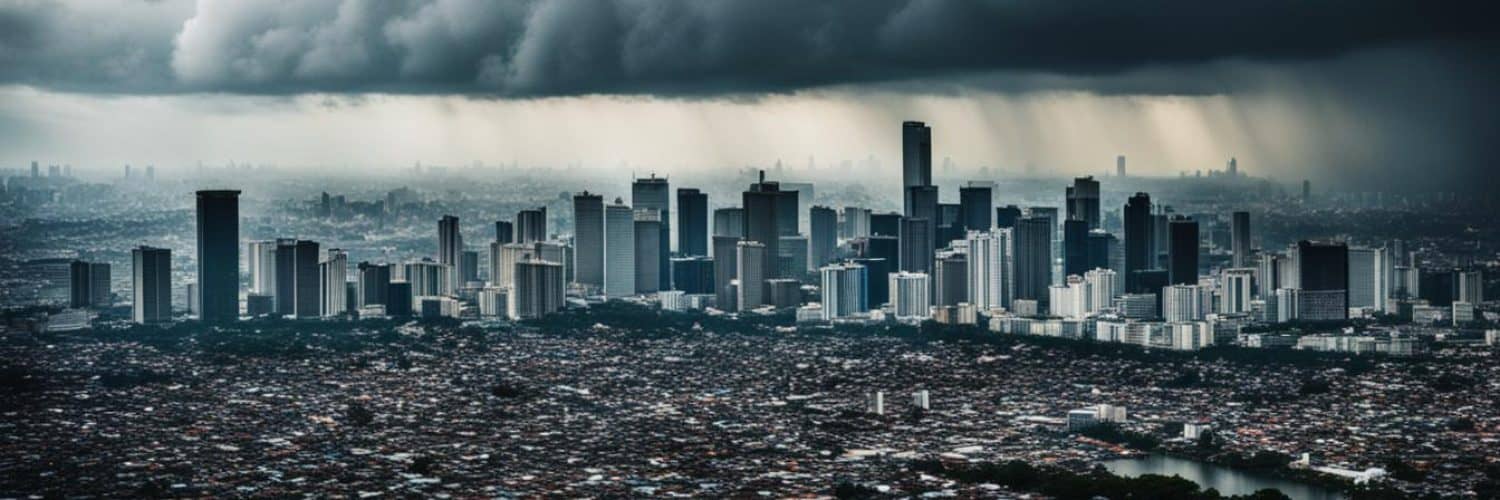As we embark on a new year, it is only natural to wonder what lies ahead and what challenges we may face. The Philippines, a nation known for its resilience and determination, has its own set of current issues in 2024 that demand attention. But amidst all the uncertainties, there is one burning question that begs to be answered:
Will the Philippines overcome its current issues and emerge stronger than ever in 2024?
This question captures the essence of our nation’s spirit – the unwavering belief in our ability to overcome challenges and emerge victorious. In this article, we will explore the various current issues that the Philippines faces in 2024 and shed light on the insights and hope that can propel us toward a brighter future.
Join us on this journey as we delve into the key issues, such as poverty incidence and economic growth, political controversies and charter change, concerns about Mindanao secession, the importance of economic reforms, Taiwan-Philippines relations, strategic calculus, implications of the PRC’s Ten-Dash Line, and the government’s commitment to building a better future.
Key Takeaways:
- The majority of Filipinos remain optimistic about 2024 despite the challenges.
- The government aims to reduce poverty incidence and achieve economic growth.
- Political controversies and fears of instability may hinder progress and discourage investments.
- Mindanao secession concerns and the need for peace and civility.
- Economic reforms and the importance of attracting foreign investments.
Poverty Incidence and Economic Growth
In the first half of 2023, the poverty incidence in the Philippines witnessed a significant decrease to 22.4 percent. This positive trend was observed in 14 out of 17 regions, indicating progress in alleviating poverty across the country. To build on this achievement, the government has set ambitious targets to further reduce the poverty incidence rate. By 2025, the aim is to achieve a poverty incidence rate of 12.9-13.2 percent, and to reach single-digit levels by 2028.
The Philippine economy has also demonstrated resilience and growth. In 2023, it outperformed other major economies in Asia, achieving a growth rate of 5.6 percent. This robust economic performance has positioned the Philippines as a promising investment destination and has attracted attention from both local and foreign investors. The International Monetary Fund projects a rebound in economic growth to 6 percent in 2024, indicating a positive outlook for the country’s economic development.
“The reduction of poverty incidence in the Philippines highlights the concerted efforts of the government and reflects the resilience and determination of the Filipino people. This progress sets the stage for further economic development and improved living standards across the nation.”
Political Controversies and Charter Change
Political controversies have become a contentious issue in the Philippines, stirring concerns about the stability of the country. One such controversy is the people’s initiative for Charter change, which seeks to amend the restrictive economic provisions in the constitution. While Charter change holds the promise of attracting foreign investments and boosting the economy, it is essential to navigate this process with transparency and proper procedures to avoid suspicions of deceit. Thorough debates and discussions are necessary to ensure that the proposed changes align with the best interests of the nation and its citizens.
“Political controversies are an inherent part of any democratic process. It is crucial, however, to address these controversies responsibly and ensure the stability of the country.”
Charter change presents an opportunity to revitalize the economy and promote a more business-friendly environment in the Philippines. By amending outdated economic provisions, the country can attract foreign investments, stimulate job growth, and foster sustainable economic development. However, amid the pursuit of change, it is essential to maintain transparency, uphold democratic principles, and address potential controversies that may arise.
It is key to strike a balance between the urgency for economic progress and the need to protect the interests of the people. Incorporating diverse perspectives and engaging in constructive dialogue can help shape the proposed changes effectively. By doing so, the Philippines can pave the way for a more prosperous future while maintaining the trust of its citizens and the international community.
Economic Benefits of Charter Change
Charter change offers significant economic advantages for the Philippines:
- Attracting foreign investments: Removing restrictive economic provisions can create a more welcoming environment for foreign investors, boosting job creation and economic growth.
- Enhancing competitiveness: Modernizing economic policies can increase the country’s global competitiveness, attracting businesses and fostering innovation.
- Expanding industries: By opening up sectors previously limited to Filipino citizens or corporations, Charter change can encourage the growth of industries and facilitate technology transfer.
- Encouraging trade partnerships: An updated economic framework can enable the Philippines to enter into mutually beneficial trade agreements with other nations, expanding market access and opportunities for local businesses.
With careful deliberation, proactive engagement, and a clear focus on public interest, Charter change has the potential to bring about positive transformation in the Philippine economy. Embracing change is necessary for progress, but it must be achieved through a democratic and inclusive process that values transparency, accountability, and open discourse.
| Pros | Cons |
|---|---|
| Attracts foreign investments | Raises concerns about the stability of the country |
| Fosters economic growth and job creation | May lead to suspicions of deceit if not handled transparently |
| Promotes a business-friendly environment | Requires thorough debates and discussions to address potential controversies |
| Enhances global competitiveness | Needs to balance economic progress with protection of citizen interests |
| Expands industries and encourages innovation | Requires careful navigation to uphold democratic principles |

Mindanao Secession Concerns
Fears of instability have been amplified by pronouncements made by former President Duterte about Mindanao secession. Article 1 of the 1987 Constitution states that the national territory includes the Philippine archipelago and all other territories over which the Philippines has sovereignty or jurisdiction.
Officials of the Bangsamoro Autonomous Region in Muslim Mindanao disagree with secession, as they are committed to protecting the gains of the peace processes and promoting peace and civility in Mindanao.
Importance of Economic Reforms
The Philippines is at a critical juncture in its economic development, and implementing comprehensive economic reforms is vital for sustained growth and prosperity. It is crucial to address the restrictive and overly protective economic provisions in the Constitution that hinder the country’s economic potential and attractiveness to foreign investors.
By removing barriers and fostering a more open and competitive business environment, the Philippines can unlock new opportunities for both domestic and international investors. This will lead to increased job creation, higher wages, and improved living standards for the Filipino people.

Moreover, economic reforms will enable the government to generate more revenue and allocate resources efficiently. This revenue can be channeled into strategic investments, such as upgrading the capability of the armed forces, thus enhancing national security. However, without a strong economy, it becomes challenging to afford the necessary military modernization plans.
By investing in education, infrastructure, and innovation, the Philippines can build a robust and resilient economy that can weather global uncertainties and harness its full potential. These economic reforms will attract foreign direct investment, spur technological advancements, and promote inclusive growth that benefits all segments of society.
“Economic reforms are not just about numbers; they are about empowering individuals, creating opportunities, and building a brighter future for all Filipinos.” – President Marcos
International experience has shown that economic reforms are a catalyst for transformation and can uplift nations from underdevelopment to prosperity. Countries like Singapore and South Korea have successfully implemented economic reforms, which have paved the way for remarkable economic growth and improved living standards.
It is time for the Philippines to embark on a similar path and push through necessary economic reforms. Through strategic and well-executed measures, the country can unlock its full potential, attract investments, create jobs, and ensure a brighter future for all Filipinos.
| Economic Reforms Benefits | Key Actions |
|---|---|
| Increased job creation | 1. Amend restrictive economic provisions in the Constitution 2. Streamline business registration and licensing processes |
| Higher wages | 1. Foster competition and innovation in key industries 2. Enhance labor market flexibility |
| Improved living standards | 1. Invest in education and skills development 2. Develop sustainable infrastructure projects |
| Enhanced national security | 1. Allocate resources for military modernization 2. Strengthen partnerships with key allies |
| Inclusive growth | 1. Promote small and medium-sized enterprises 2. Provide targeted social assistance programs |
Taiwan-Philippines Relations
The Philippines is currently reassessing its strategic calculus regarding Taiwan, recognizing the importance of establishing strong ties for a peaceful and stable regional environment. While both countries maintain unofficial relations through economic and cultural office bases, there is significant potential for deeper collaboration.
Recognizing the geo-economic potential of this partnership, the Philippines has acknowledged the valuable contributions of overseas Filipino workers in Taiwan’s thriving electronics industry. Additionally, both countries stand to benefit from increased trade and tourism opportunities.
Viewing Taiwan as an important partner in the region, the Philippines is actively seeking to strengthen bilateral relations and explore avenues for cooperation in various sectors. By leveraging the resources and expertise of both nations, mutually advantageous outcomes can be achieved.
The collaboration between Taiwan and the Philippines has the potential to drive socio-economic development, foster regional stability, and create new opportunities for growth. Through sustained efforts, these two countries can collectively navigate challenges and forge a prosperous future together.
Key Points:
- The Philippines is reassessing its strategic calculus regarding Taiwan.
- Both countries maintain unofficial relations through economic and cultural office bases.
- The Philippines recognizes the geo-economic potential of having strong ties with Taiwan.
- Contributions of overseas Filipino workers to Taiwan’s electronics industry are significant.
- Both countries stand to benefit from increased trade and tourism opportunities.
- The Philippines views Taiwan as an important partner in the region.
By strengthening Taiwan-Philippines relations, opportunities for growth and collaboration can be maximized, resulting in shared benefits for both nations.
The Philippines' Strategic Calculus
The Philippines is strategically adapting to the shifting power dynamics in the region, considering its position and interests. While the West Philippine Sea remains a top concern, the country also recognizes the significance of cross-Strait relations, including the potential risks and implications of a Taiwan Strait contingency. Maintaining regional stability and safeguarding its national interests are paramount.
The Philippines aims to keep Beijing limited to a “strategic buffer” while fostering alliances and partnerships that contribute to regional power balance. By engaging in strategic relationships, the country seeks to influence regional dynamics and shape outcomes that align with its long-term interests. This approach allows the Philippines to proactively participate in discussions and decision-making processes that impact the region.
The 2022 crisis and the subsequent expansion of the US-Philippines Enhanced Defense Cooperation Agreement have played significant roles in shaping the country’s strategic calculus. These events have prompted the Philippines to reassess its defense and security policies, strengthening its cooperation with the United States and seeking opportunities for collaboration with other regional partners.
The Philippines understands the importance of strategic foresight and adapts its calculus to maintain a favorable regional power balance. By actively engaging in diplomacy and reinforcing alliances, the country aims to protect its sovereignty and promote stability in the region.
The strategic considerations of the Philippines include:
- Ensuring national security and territorial integrity
- Maintaining regional stability and balance of power
- Promoting economic growth and development
- Fostering cooperation and partnerships with like-minded nations
The Philippines recognizes the value of a multilateral approach in addressing regional challenges. By working together with other countries, the Philippines can contribute to the collective security and prosperity of the region while safeguarding its own interests.
Regional Power Balance
The concept of regional power balance is fundamental in the Philippines’ strategic calculus. It involves the distribution of power among states in a particular region, aiming to prevent any single country from dominating and destabilizing the region. This balance encourages diplomacy, cooperation, and the peaceful resolution of disputes.
Through strategic alliances and partnerships, the Philippines seeks to enhance its influence and contribute to regional power balance. By actively participating in regional forums, such as the Association of Southeast Asian Nations (ASEAN), the Philippines collaborates with other countries to foster a peaceful and prosperous environment.
| Benefits of Regional Power Balance for the Philippines | Drawbacks of Regional Power Imbalance for the Philippines |
|---|---|
| Enhanced national security | Increased vulnerability to external pressures |
| Opportunities for economic growth and development | Limited influence and bargaining power |
| Peaceful resolution of disputes | Risk of being marginalized or isolated |
By actively engaging in the pursuit of regional power balance, the Philippines aims to secure its national interests, contribute to the well-being of its people, and promote peace and stability in the region.
Implications of the PRC's Ten-Dash Line
The recent release of the PRC’s Ten-Dash Line has significant implications for the Philippines and the region. This controversial map claims almost the entire South China Sea and Taiwan, causing concern among neighboring countries.
The PRC’s Ten-Dash Line has aligned the Philippines with regional allies and partners who share common interests in maintaining peace and stability in the Indo-Pacific region. In response to this assertive claim, the Philippines has taken diplomatic and strategic actions to safeguard its territorial integrity and promote regional cooperation.
One example of the Philippines’ proactive stance is the hosting of joint training exercises focused on a potential Taiwan scenario. These exercises strengthen defense and security cooperation between the Philippines and its allies, demonstrating a commitment to regional stability.
“The Philippines’ hosting of joint training exercises and its talks with the US military to develop a civilian port in close proximity to Taiwan signal a clear message of solidarity and support in the face of the PRC’s territorial claims.”
By establishing closer ties with Taiwan on both maritime and economic fronts, the Philippines aims to enhance its strategic position and counterbalance the PRC’s influence in the region. This collaboration opens doors for increased trade, tourism, and cultural exchange, benefiting both nations.
Philippines-Taiwan Relations
The Philippines recognizes the geo-economic potential of strong ties with Taiwan. Both countries have made efforts to nurture economic cooperation and people-to-people exchanges over the years. Taiwan has been a vital destination for overseas Filipino workers, particularly in the electronics industry, contributing to the economies of both countries.
Strengthening the Philippines’ relationship with Taiwan not only diversifies its economic partnerships but also enhances its security. The Philippines recognizes the importance of maintaining stability in the region and building a network of like-minded countries to ensure peace and prosperity.
Overall, the implications of the PRC’s Ten-Dash Line have motivated the Philippines to fortify its alliances, pursue strategic partnerships, and promote a rules-based order in the region. By joining forces with regional allies and partners, the Philippines aims to protect its territorial integrity, leverage economic opportunities, and contribute to the stability and development of the Indo-Pacific.
| Implications of the PRC’s Ten-Dash Line | Actions Taken by the Philippines |
|---|---|
| Claims almost the entire South China Sea and Taiwan | Hosted joint training exercises |
| Raises concerns among neighboring countries | In talks with the US military for a civilian port near Taiwan |
| Aligns the Philippines with regional allies | Establishing closer ties with Taiwan |
| Prompts diplomatic and strategic actions | Enhancing defense and security cooperation |
| Strengthens commitment to regional stability | Enhancing economic cooperation and people-to-people exchanges |
| Opens doors for increased trade and tourism | Contributing to the stability and development of the Indo-Pacific |
Building Better for the New Year
As the New Year begins, President Marcos has set a powerful resolution for the government – to provide excellent and honest service to the Filipino people. With this commitment, the government aims to eliminate the cumbersome rules and regulations that hinder the efficient delivery of public services and impede project implementation.
The administration has already achieved significant milestones in its pursuit of improving government service. Notable accomplishments include the construction of specialty centers, classrooms, and cold chain facilities, which directly benefit the Filipino population and contribute to the nation’s progress.
Moreover, the government has initiated assistance programs to support the needy and empower individuals to overcome their current circumstances. Programs like the Tulong Panghanapbuhay sa Ating Disadvantaged/Displaced Workers (TUPAD) and Assistance to Individuals in Crisis Situations (AICS) provide vital aid, ensuring that no Filipino is left behind.
“Our commitment is to build a brighter future for every Filipino. We will continue to work tirelessly, delivering quality services and opportunities that uplift lives and unite the nation.” – President Marcos
The government recognizes that by focusing on these crucial aspects of governance, it can create a society where progress and prosperity are shared by all. The emphasis on efficient and honest government service is a testament to its dedication to the welfare and empowerment of the Filipino people.
| Government Milestones Achieved | Benefits |
|---|---|
| Construction of specialty centers | Improved access to specialized services for Filipinos |
| Building new classrooms | Enhanced educational infrastructure and learning environment |
| Cold chain facility development | Preservation of agricultural products, ensuring food security and reducing waste |
The government’s New Year’s resolution serves as a guiding principle for all its endeavors. By prioritizing excellence and honesty in service delivery, the administration seeks to build trust, inspire confidence, and create a better Philippines for all.

With each passing year, the government’s commitment to serving the Filipino people grows stronger. The New Year brings fresh opportunities to build better, address challenges, and shape a future of progress and prosperity.
Optimism for the Future
Despite the challenges that the Philippines may face in the coming year, President Marcos expresses optimism and confidence in the Filipino people. He believes that the country’s resilient spirit, inherited from past heroes, will help overcome any difficulties.
The government’s commitment to building a better future, coupled with hard work and determination, will pave the way for progress and development. The successes of 2023 have prepared the Philippines for the challenges of 2024.
Philippines' Resilient Spirit
“It is the indomitable spirit of the Filipino people that has carried us through the toughest of times. We have faced adversity before and emerged stronger. I have full faith in the inherent strength and resilience of the Filipino spirit to overcome any challenges that lie ahead.”
– President Marcos
Building a Better Future
The government’s focus on building a better future highlights its dedication to creating an environment of growth and prosperity for all Filipinos. Policies and programs aimed at poverty reduction, economic reforms, and infrastructure development are laying the foundation for a brighter tomorrow.
Preparing for Challenges
Recognizing the potential obstacles, the Philippines is actively preparing to face the challenges of 2024. Efforts to enhance disaster resilience, promote sustainable development, and foster innovation are key components of the government’s proactive approach.
- Disaster Resilience: Strengthening disaster preparedness, response, and recovery systems.
- Sustainable Development: Prioritizing sustainable practices and conservation of natural resources.
- Innovation: Encouraging investment in research and development, and promoting technological advancements.
Key Initiatives for a Better Future
| Initiative | Description |
|---|---|
| Economic Reforms | Amending restrictive economic provisions to attract foreign investments and stimulate economic growth. |
| Infrastructure Development | Investing in the development of public infrastructure to improve connectivity and bolster economic activities. |
| Educational Reforms | Implementing educational reforms to enhance the quality of education and empower the youth with necessary skills. |
| Healthcare Advancements | Expanding healthcare services and improving access to quality healthcare for all Filipinos. |
President Marcos, along with the Filipino people, remains steadfast in their determination to overcome challenges and shape a better future for the Philippines. With strategic planning, perseverance, and a united spirit, the country is poised to overcome obstacles and achieve sustainable progress.
Conclusion
In conclusion, the Philippines faces a range of current issues in 2024, including political controversies, economic challenges, and regional concerns. However, there is hope and optimism among the Filipino people, as evidenced by high survey ratings.
The government is focused on addressing these issues and implementing reforms to achieve economic prosperity, improve relations with Taiwan, and ensure regional stability. By enacting economic reforms and attracting foreign investments, the Philippines aims to further reduce poverty incidence and foster sustained economic growth.
While political controversies and fears of instability may present challenges, the Philippines has demonstrated resilience in the face of adversity. With a strong spirit and a commitment to building a better future, the country is poised to overcome obstacles and achieve progress. By working together with dedication and perseverance, a brighter future for the Philippines in 2024 and beyond is within reach.
FAQ
What are the current issues in the Philippines for 2024?
The Philippines faces a range of current issues in 2024, including political controversies, economic challenges, and regional concerns.
What is the poverty incidence in the Philippines in 2024?
The poverty incidence in the Philippines has been decreasing, with a rate of 22.4 percent in the first half of 2023. The government aims to further reduce it to 12.9-13.2 percent by 2025 and single-digit levels by 2028.
How is the economic growth in the Philippines in 2024?
The Philippine economy grew by 5.6 percent in 2023, outperforming other major economies in Asia. The International Monetary Fund projects a rebound in economic growth to 6 percent in 2024.
What are the political controversies in the Philippines in 2024?
Political controversies in the Philippines include the people’s initiative for Charter change, which raises concerns about the stability of the country.
What is Charter change in the Philippines?
Charter change refers to the need to amend the restrictive economic provisions in the constitution to attract foreign investments and promote economic growth.
Are there concerns about Mindanao secession in 2024?
Fears of instability have been amplified by pronouncements of former President Duterte about Mindanao secession. However, officials of the Bangsamoro Autonomous Region in Muslim Mindanao disagree with secession and are committed to promoting peace and civility in Mindanao.
Why are economic reforms important in the Philippines?
Economic reforms are necessary in the Philippines, particularly in the restrictive economic provisions of the constitution, to achieve economic prosperity and attract foreign investments.
What is the importance of Taiwan-Philippines relations?
The Philippines recognizes the geo-economic potential of strong ties with Taiwan, including contributions of overseas Filipino workers, trade, and tourism.
How does the Philippines approach its strategic calculus?
The Philippines is adapting its strategic calculus based on shifting power dynamics in the region. It aims to maintain regional stability and limit the influence of Beijing through alliances and partnerships.
What are the implications of the PRC’s Ten-Dash Line for the Philippines?
The recent release of the PRC’s Ten-Dash Line, encompassing the entire South China Sea and Taiwan, has aligned the Philippines with regional allies and partners. The Philippines aims to establish closer ties with Taiwan on both maritime and economic fronts
What is the New Year’s resolution of the government in the Philippines?
President Marcos’s New Year’s resolution for the government is to provide excellent and honest service to Filipinos. The government aims to eliminate rules that hinder project implementation and delivery of public services.
Is there optimism for the future of the Philippines?
Despite the challenges, President Marcos expresses optimism and confidence in the Filipino people. The government’s commitment to building a better future, coupled with hard work and determination, will pave the way for progress and development.
Source Links
- https://globaltaiwan.org/2023/10/evolving-not-evading-the-philippines-national-security-policy-and-its-strategic-calculus-in-taiwan/
- https://www.philstar.com/opinion/2024/02/04/2330751/lets-hope-we-dont-get-left-behind-again
- https://www.philstar.com/headlines/2024/01/02/2322846/marcos-vows-build-better-more-2024














Add comment